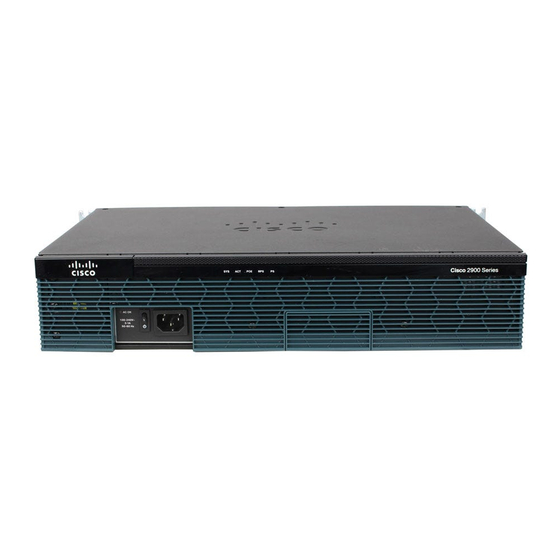Cisco 2911 Технічний паспорт - Сторінка 8
Переглянути онлайн або завантажити pdf Технічний паспорт для Мережевий маршрутизатор Cisco 2911. Cisco 2911 16 сторінок. 2900 series integrated services routers
Також для Cisco 2911: Посібник (10 сторінок)

Application Acceleration
The Cisco 2900 Series seamlessly combines industry leading security, IOS-based traffic control and visibility, with
Cisco application acceleration solutions. Cisco IOS Software features such as NBAR, IP SLA, and NetFlow provide
visibility and monitoring of traffic patterns and application performance while IOS features such as QoS, ACLs, and
PfR intelligently control the traffic to maximize the quality of the user experience and employee productivity. The
user experience can be further enhanced through the addition of a Cisco WAAS Network Module which can be
used to securely provide more advanced WAN optimization techniques such as TCP optimization, caching,
compression, and application acceleration. Cisco Integrated Services Routers combined with Cisco WAAS
Network Modules, provide optimal performance for applications delivered from a central data center to branch-
office users. The solution allows you to consolidate costly server, storage, and backup infrastructure into data
centers while maintaining LAN-like service levels for remote users.
Cisco Services Ready Engine
The Cisco Services Ready Engine solution is available in a Service Module (SM) and Internal Service Module
(ISM) form factor. The Service Module hardware offers up to a seven times performance improvement over the
previous generation Network Modules and provides a multi-core x86-64 processor. The SRE modules also support
up to 1 terabyte of storage, RAID configurations, hardware-assisted virtualization and cryptography options. The
Cisco SRE module enables on-demand provisioning of branch-office applications on the Cisco 2900 Series
platforms so that you can deploy the right application, at the right time, in the right place. The hardware and
software decoupling provided by the service-ready deployment model enables applications to be provisioned on
the module at the time of its installation or remotely anytime thereafter. Supported solutions include Cisco Wide
Area Application Services (WAAS), Cisco Unity Express, Cisco Application Extension Platform (AXP), Cisco
Wireless LAN Controller (WLC), Cisco Video Surveillance, and other applications under development. The Service
Ready Engine enables organizations of various sizes to future-proof their network by allowing them to quickly
deploy new branch-office applications without deploying new hardware, reducing the cost of rolling out branch-
office services.
WAAS Express
Organizations today face several unique wide area network (WAN) challenges: the need to provide employees with
constant access to centrally located information, the requirement to continuously back up and replicate mission-
critical data to centrally managed data centers, the desire to provide satisfactory experience for IP phone and video
communication, and the mandate to control bandwidth costs without sacrificing application availability and
performance.
Cisco WAAS Express is designed to help organizations address these challenges. Cisco WAAS Express extends
the
Cisco WAAS product portfolio
with a small-footprint, cost-effective IOS-based software solution integrated into
the ISR G2 to offer bandwidth optimization and application acceleration capabilities. Cisco WAAS Express
increases remote user productivity, reduces WAN bandwidth costs, and offers investment protection by
interoperating with existing Cisco WAAS infrastructure. Cisco WAAS Express is unique in providing network
transparency, improving deployment flexibility with on-demand service enablement, and integrating with native
IOS-based services such as security, NetFlow, and QoS.
Cisco WAAS Express is fully interoperable with WAAS on SM-SRE modules, WAAS appliances and can be
managed by a common WAAS Central Manager.
Cisco WAAS Express is available in IOS from version 15.1(2)T1.
© 2013 Cisco and/or its affiliates. All rights reserved. This document is Cisco Public Information.
Page 8 of 15
